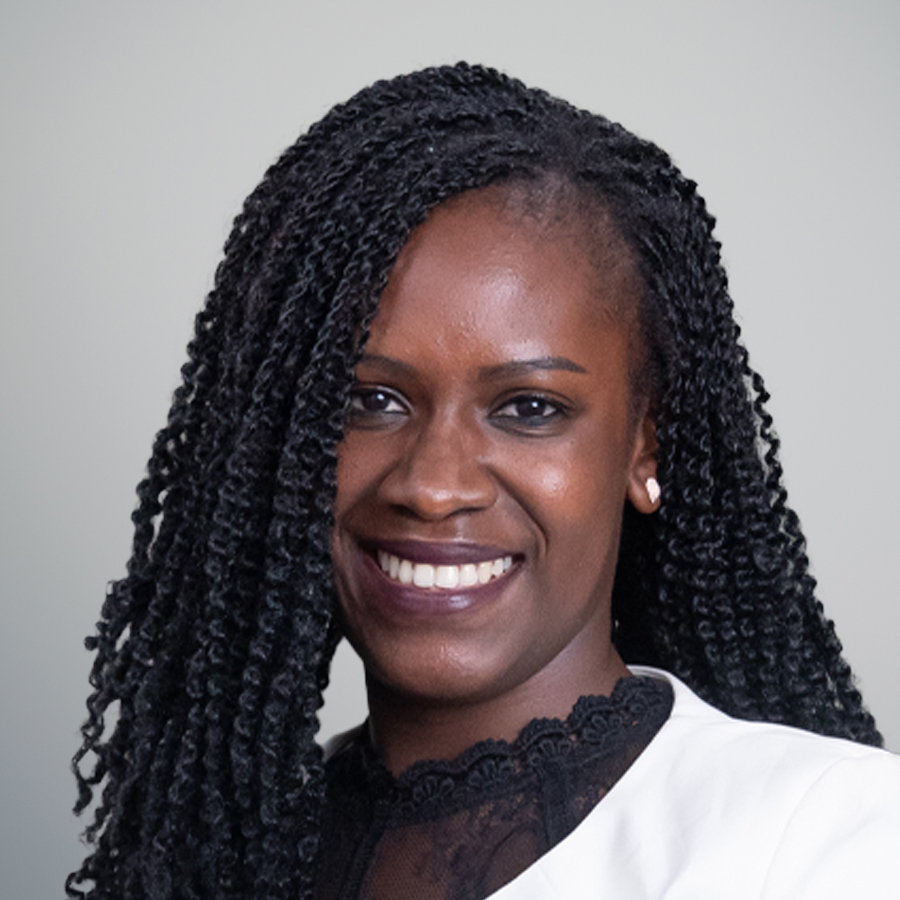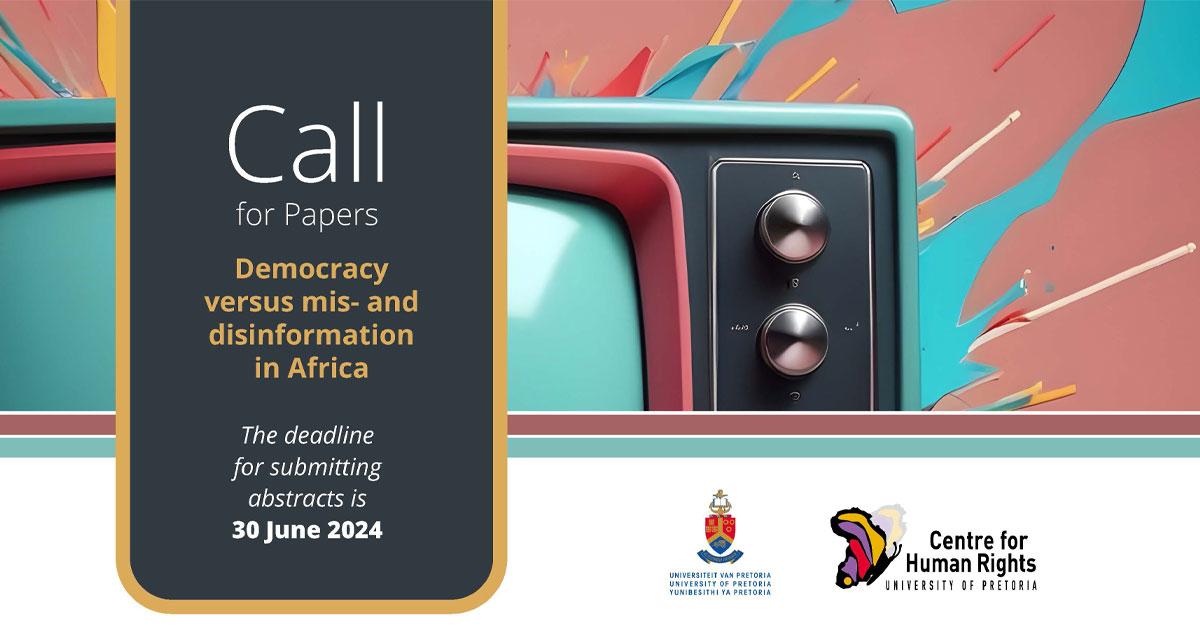The Centre for Human Rights, University of Pretoria is pleased to launch this call for book chapters on the theme of democracy versus mis- and disinformation in Africa. The deadline for submitting abstracts is 30 June 2024.
Background
The 2024 World Economic Forum global risks report ranks misinformation and disinformation as the most severe short-term global risks. Also known as false news, misinformation and disinformation share a definitional similarity of falsity. However, while misinformation is shared without the knowledge of its falseness and without an intention to cause harm, disinformation is created and shared to cause harm. The malign effects of false news manifest in increased social discord, undermining of public institutions and processes, public manipulation, and in volatile cases, violence and radicalisation.
Mis-and disinformation is a cross-cutting phenomenon affecting various sectors including elections, peace and security, public policy, health, climate and education. False news disseminated in the context of elections has the potential to disrupt an election, suppress voting, affect election outcomes, discredit electoral processes and institutions, wrongly cast aspersions on political parties and candidates and foment electoral violence. About 25 African countries have some form of election scheduled in 2024, the designated year of democracy. Mitigating strategies for false news are crucial to protect the integrity of these processes. On the right to health, the COVID-19 pandemic offers a good case study of the deleterious effects of false news. Falsehoods on vaccine efficacy and preventive measures and treatments gravely impacted the management of the pandemic. The sheer magnitude of health-related misinformation prompted the World Health Organisation (WHO) to dub the situation an infodemic. The scenario is replicated in the wake of destabilising events such as social and political crises, coups and conflicts when the public has a heightened need for information on developments. Additionally, false news targeting vulnerable and disadvantaged groups such as women, children, persons with disabilities and sexual minorities threatens their right to public and political participation, freedom of expression, security of person and even right to life.
Despite Africa grappling with the digital divide, false news has and continues to pose a significant threat to social cohesion, election integrity and democracy. In the broad scheme of the global decline in freedoms including internet freedom, Africa, which carries the weight of authoritarian governments, is gravely affected. Unfortunately, the rise of false news emerges against the backdrop of the decline of professional public interest media engendered not only by the changing information and communication landscape affecting media sustainability but also by prevailing challenges including political and economic interference. The complicity of powerful actors such as domestic governments and foreign actors in creating and spreading disinformation complicates an already worrying situation. Kenya, Nigeria and Zimbabwe present good case studies on domestic-sponsored disinformation. In coup-affected countries in West Africa such as Burkina Faso, Mali and Niger foreign actors were revealed as the main drivers of disinformation campaigns.
Although trading in untruths is not a novel phenomenon, the increasing influence of digital technologies, especially social media, in our information and communications zeitgeist has amplified the ability to access and spread false information and hateful and violent content. The growing field of generative Artificial Intelligence (AI) further simplifies the creation of disinformation in text, audio and video formats. Targeted mis and disinformation further elicit privacy and data protection concerns. Big Tech therefore plays a key role in determining the quality of the media and information parlance. How individuals exercise human rights and fundamental freedoms such as freedom of expression, access to information and right to privacy is affected by the policies and actions of social media companies such as Meta, Google, X (formerly Twitter) and TikTok.
Content moderation policies regulating the spread of harmful and illegal content on social media platforms, by themselves, have done little to rein in the proliferation of such content online. Whistle-blowers, current and former employees of social media companies and grey and academic research have revealed the impact of poor enforcement of social media policies on the polluted online space. Studies have linked the amplification of negative content with increased online engagement by social media users; a human vice that social media companies have exploited. The poor indictment on effective content moderation of harmful and illegal content by social media companies is especially dire outside Western countries. Recent studies during elections in Kenya and South Africa disclose the disproportionate attention given to African countries even during critical periods such as elections. Language and context ignorance aggravate poor content moderation practices in Africa.
African governments have heavily relied on regulation to combat mis and disinformation. However, the findings of studies such as LEXOTA: Laws on Expression Online-Tracker and Analysis flag the potent risk of digital authoritarianism from existing and emerging laws on disinformation in sub-Saharan Africa. Although countries such as Ethiopia, South Africa, Uganda and Zimbabwe have enacted provisions seeking to impose conditional liability on internet intermediaries such as social media companies for third-party content on their platforms, regulatory countermeasures for social media accountability and transparency in Africa are inadequate. More so, countries need rights-based approaches. More than ever, there is a need for all stakeholders including governments, international organisations, media, civil society, academia and the private sector to interrogate and undertake their duties towards advancing a human rights approach to addressing mis and disinformation. International law frameworks such as the International Covenant on Civil and Political Rights and the African Charter on Human and Peoples’ Rights provide a crucial normative foundation for the protection of these rights. States are obligated to respect, protect and fulfil these rights and non-state actors must at least respect human rights.
The above commentary provides a brief depiction of the complicated phenomena of false news besetting the global and African landscape and threatening democracy, stability and social cohesion. There is great potential for an in-depth and contextualised exploration of mis and disinformation in Africa to close the knowledge gap on the manifestation, intricacies, experience, effect and mitigation of false news in Africa. African-centred research and scholarship are crucial to informing context-specific strategic interventions to effectively combat false news in a rights-based manner. Towards this end, the Centre invites African scholars including early career researchers to submit book chapters covering the below themes:
- The evolution, incidence and impact of mis and disinformation in African countries. Who are the drivers of false news? What social, political, economic or other unique factors shape the information ecosystem and influence vulnerability or resilience to false news? What are the mitigating and combative strategies and are they effective? Country case studies are welcome.
- Critical and comparative analysis of normative and enforcement frameworks on false news at national, regional and international levels. What are the regulatory trends of false news in African countries and the human rights implications? Are regulatory measures at national, regional and international levels adequate? Is there synergy or conflict between national, regional and international frameworks? What is the influence of regional and international frameworks on national regulatory measures?
- Critical assessment of social media policies and actions on disinformation in Africa and their effectiveness through a human rights lens.
- Jurisprudential developments at national, regional and international levels on the regulation of false news. Case studies and comparative analysis are encouraged.
- Democracy and human rights implications of AI-generated misinformation and disinformation and remedial measures. How are African countries confronting the implications of rapidly evolving technologies on the integrity of their information systems? Case studies and comparative analysis are encouraged.
- Analysis of the undertaking of duties by different stakeholders including states, parliamentarians, international organisations, Big Tech, civil society, media and/or the private sector in combating mis and disinformation.
- The manifestation and enabling of foreign-sponsored disinformation in African countries and the impact on democracy and human rights.
- Thematic examination of false news targeting vulnerable and minority groups, health, education and climate issues among others. The discussion can refer to case studies and proactive and mitigating approaches by different stakeholders.
- Mis and disinformation as a threat to free, fair and credible elections in Africa and proactive and mitigating approaches.
- Role of privacy and data protection in confronting mis and disinformation. How are existing regulatory frameworks on privacy and data protection safeguarding against targeted false news and are they adequate?
- Analysis of disinformation as a growing cybersecurity threat. Are existing cybersecurity regulations and approaches adequate?
Conference
Upon receiving the first drafts of the chapters, the Centre will organise an online conference in December 2024 where authors will present their findings and receive feedback from their peers. The papers will be subjected to a double-blind peer review process before they are eligible for publication. The Pretoria University Law Press (PULP) will publish the final book chapters.
Timelines:
- 30 June 2024 - Submission of chapter abstracts
- 2 December 2024 - Submission of full chapter drafts
- December 2024 - Democracy versus mis- and disinformation in Africa conference
Application procedure
Interested applicants should send their abstracts on the above themes to Marystella Simiyu marystella.simiyu@up.ac.za, copying ompha.tshamano@up.ac.za and henok.kremte@up.ac.za by 30 June 2024. The abstracts should be in English and not exceed 500 words.
For more information contact:

Tel: +27 (0) 12 420 3180
Fax: +27 (0) 86 580 5743
marystella.simiyu@up.ac.za


